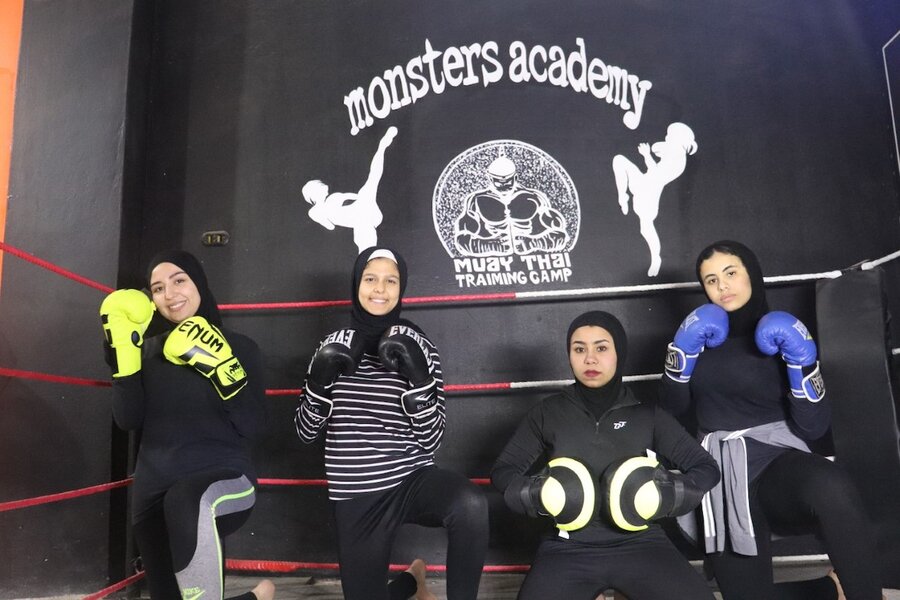Five years ago, after being subjected to sexual harassment, the Egyptian girl Samah Ahmed began learning Thai boxing. She has become a martial arts trainer for about 40 people, most of them women and girls.
The academy, which Samah called Monster Academy, is the most recent trend Egyptian women have taken up to confront harassment in light of the weakness of laws and justice that are often unable to punish the harasser. This also confronts the culture of blaming the victim instead of the harasser.
From her academy that she founded, located in the Abu Zaabal area about 30 kilometres northeast of the capital, Cairo, Samah said, “Girls will not need to carry weapons to defend themselves… They can use their bodies for defence.” She added that she called her institution the Academy of Monsters because it required the monster’s courage and strength to learn Thai boxing.
A United Nations survey in 2013 found that 99 per cent of Egyptian women had experienced harassment. In 2014, Egypt enacted penalties of at least six months in prison or fines of not less than EGP 3,000 ($188) for harassment crimes after assaulting women near Tahrir Square in Cairo during Abdel Fattah Al-Sisi’s inauguration celebrations. Police officers now patrol public holidays or celebrations, but all this did not prevent harassment, which has increased in frequency in recent years.
At first, Samah’s parents refused to let her do what she does, saying that martial arts were only for men. “I insisted on learning it and even educating other girls,” she said, standing in front of a black wall painted in white shades of women taking high kicks and other fighters in the ring. Female fighters said about the academy that it is important for them to feel safe, live fully, and move freely. Feeling able to defend themselves is a part of this.
Many young Egyptian women, such as Samah, are pushing for change, as hundreds have reported on social media about sexual assault as part of the “Me Too” campaign that started in 2017 in the United States. Perhaps this campaign was an outlet for girls in the face of sexual harassment after they lacked a safe zone on the ground, so they replaced it with virtual reality on social media to speak and hunt harassers. Only 26 per cent of women in Egypt participate in the workforce, compared to 79 per cent of men, according to the 2015 Global Gender Gap Index, which ranked the North African country 136th out of 145 countries in terms of gender equality. Perhaps this academy is the natural development to the Assault Police, a page on Instagram, which revealed stories of more than 100 girls whom young men have raped and sexually assaulted.
An Egyptian girl initiated sharing her experience of being raped online as a campaign, and testimonies were shared online. The testimonies soon followed, and the controversy expanded to include all social media platforms in Egypt amid broad solidarity with women. The support campaigns for victims of harassment and rape were not only limited to women. It also included men who were fed up with their peers’ negativity, about a phenomenon that many girls suffer almost daily.
Bloggers and tweeters talked about why girls and women are reluctant to submit official reports if subjected to harassment or rape. Others began to discuss the causes of the spread of the phenomenon of harassment in Egyptian society, and Arab societies in general, despite the existence of laws that criminalise it. Some of them attributed it to incorrect cultural practices and beliefs, such as the culture of shame and male education, which forbid talking about sex and then turn a blind eye to physical abuse.
On the other hand, many women announced their uprising in the face of what they described as “the duplication of society in dealing with these issues.” They pointed out that with every incident of harassment or sexual assault that comes out into the open, the victim becomes a criminal. She is not only forced to confront the harasser but collides with an entire social system that justifies the perpetrator’s act and stigmatises the survivors. Many commentators on social media call for the defamation of harassers as a social punishment in the light of weak justice.





Recent Comments